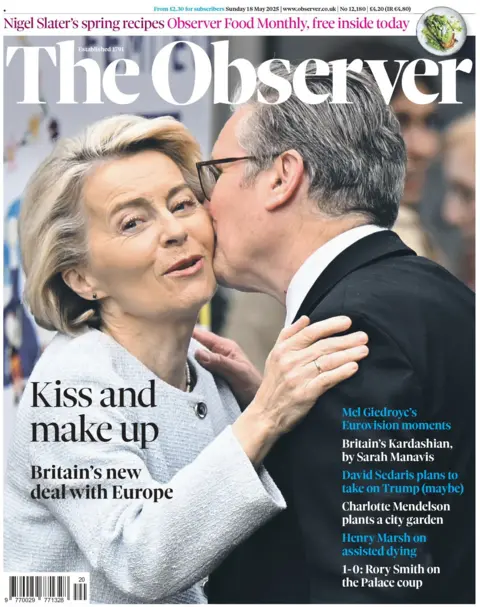The recent developments surrounding Sir Keir Starmer’s anticipated summit with European Union officials are making headlines in multiple UK newspapers. This planned meeting is seen as a critical moment for the Labour leader as he seeks to negotiate a new deal that aims to redefine the UK’s relationship with the EU. Such efforts have sparked considerable debate and controversy among politicians and pundits alike, with different media outlets framing the summit in various ways.
The Observer prominently features a photograph of Starmer warmly greeting Ursula von der Leyen, the President of the European Commission, underscoring the significance of this upcoming summit. Starmer’s spokesperson has claimed that this meeting will pave the way for a fresh agreement with the EU, which could have profound implications for post-Brexit Britain. Within this context, Starmer’s approach has been both applauded and criticized, as some argue that it may lead to a perceived surrender to the EU’s demands.
Contrasting views emerge from other news outlets, such as the Mail on Sunday, which refers to the summit as a “surrender summit.” They argue that the deal could require taxpayers to pay hundreds of millions of pounds and will permit EU vessels to continue fishing in British waters, drawing sharp criticism from those who feel it undermines British sovereignty. Such concerns reflect a broader apprehension about the implications of renewing ties with the EU after Brexit, with critics warning this could “open the floodgates” to more immigration.
Moreover, the Sunday Express has echoed these sentiments, featuring a stark headline: “Betray Britain at your peril.” The article features comments from Nigel Farage, leader of Reform UK, who cautions that Prime Minister Rishi Sunak could face voter backlash if he appears too compliant with EU expectations. Farage’s sentiment resonates with a segment of the electorate that remains concerned about keeping immigration and border control firmly under domestic governance, rather than succumbing to external pressures.
In addition to the EU discussions, other notable stories are emerging from British newspapers. For instance, the Sunday Times reports on the establishment of a new Home Guard as a precautionary measure against potential attacks on vital infrastructure, such as power stations and airports. This initiative is being framed as a response to the precarious global security situation, particularly tensions involving Russia, Iran, and North Korea. The new force draws parallels to the citizen army created in 1940 during WW2, emphasizing a need for increased readiness in light of current threats.
Equally essential, the Observer highlights a troubling revelation concerning the UK’s gambling regulator, which has allegedly placed 38 failing firms under special measures. This process raises questions about the compliance and accountability of the gambling sector, especially given the significant profits generated by the industry. The issue of regulatory transparency and consumer safety remains salient, particularly in today’s digital-first marketplace.
Meanwhile, discussions are also brewing concerning social media influencers who promote questionable products, such as hazardous tanning oils. The Mail on Sunday reports that a parliamentary inquiry is underway to hold these influencers accountable for their endorsements, especially given the health risks associated with their products.
As news continues to unfold regarding Starmer’s meeting with EU officials and its broader implications for the UK, the public’s reaction remains divided. Many view the summit as a critical opportunity for progress, while others see it as a potential capitulation that may undermine British interests. Regardless of the perspective, the upcoming days are poised to be significant in shaping the future trajectory of UK-EU relations and domestic policy.



